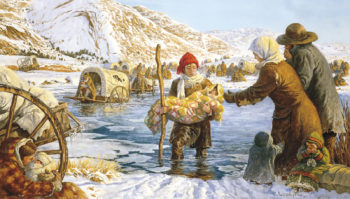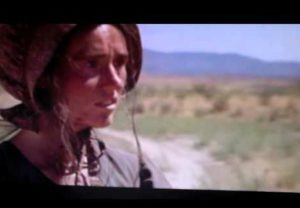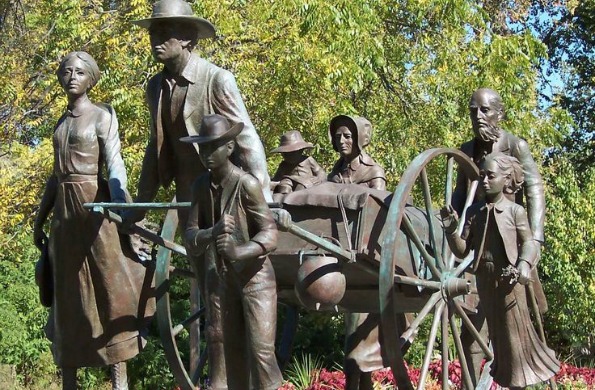I recently had a series of events that have come together to show me that our definition of what it means to rescue the lost is not broad enough. Let’s take a look at how the idea has been taught in church since the dawn of time (I am exaggerating) then let’s look at a different definition for the word rescue.
The classic story of someone going astray (the lost sheep) is found in Luke 15:4. Here the Savior tells us the parable of the lost sheep.
4 What man of you, having an hundred sheep, if he lose one of them, doth not leave the ninety and nine in the wilderness, and go after that which is lost, until he find it?
This is the story we reference each and every time we have a lesson on retrieving the lost, the inactive member. I had a lesson in priesthood just a few weeks ago on this very topic. It was well taught, with examples of those within the ward who had both been brought back over the years, as well as those who still need some help.
Lessons from the pioneers
Some of the stories we hear about rescuing in the church come from the pioneers. Many of these stories are quite famous. Brigham Young stood at the pulpit in General Conference and called for a rescue of the Willy and Martin handcart companies. We have all heard the stories of heroic sacrifices made to save these saints on the verge of dying in the cold.

Martin Handcart Company crosses the Sweetwater River
But what about some of the other, not so well publicized stories of being saved? There are many stories of people being saved by less dramatic means than that of whole companies being sent with blankets, food, and medical supplies. It is on two of these less well known rescues I would like to focus.
When the Willy and Martin handcart companies were rescued, there was such limited space in the wagons to put the people who could no longer walk, they had to leave most of their belongings behind. It is the story of those who stayed behind to guard their belongings that I wish to relate. This comes from Elder Jack H. Goaslind in a Conference talk entitled, “In His Strength I Can Do All Things”
Brother Dan W. Jones and two others from the relief party, along with 17 young men from the wagon companies, were called to stay behind to guard the property. They were left to face five winter months in Wyoming, hundreds of miles from help, with scarcely anything to eat, and under conditions of extreme privation. Imagine the sacrifice! Offers were made to each man to join the wagons bound for the valley, but every one of them chose to stay behind, obedient to the call to serve.
That winter was recorded as one of the most severe ever. The intrepid watchmen struggled to repair the cabins at Devil’s Gate; killed the remaining cattle; stored the tough, stringy beef for food; and reconditioned and stacked the goods they were left to protect.
They killed a few buffalo, but the hunting became bad. Soon they were reduced to living on animal hides, from which they scraped off the hair, then boiled the leather. They ate the leather wrappings off the wagon tongues, old moccasin soles, and a well-worn buffalo hide that had been used as a foot mat for two months. At one point Dan Jones was literally preparing to eat his own saddle!
Finally, in May, the relief wagons arrived and they were able to return home. This was not your typical rescue. These men suffered all kinds of privation just to protect the few goods the handcart companies had to abandon when they were physically rescued more than six months before.
Sometimes when we are called upon to rescue, the service required is not in the printed handbook. These beleaguered saints were at the point of death. They could no longer care for themselves. These men volunteered to do what none in the handcart companies were able to do, and that was to protect their belongings.
Another touching story you can see for yourself in this video clip from the movie called 17 Miracles. This sister had done all she could bring herself to do. She had reached the end of her proverbial rope, and was ready to sit down and die. Her daughter prayed for help from the Lord. And how did the help come? It came in the form of a cake.

Click on image to view video.
A simple cake that revived and refreshed her soul and gave her the strength and hope she needed to continue on. Click here or on the image to link to the video.
The point of this story is that we don’t always know what is needed to rescue the lost, but the Lord does. This sister was not weak in the faith. She had buried children along the road and had suffered all kinds of privations in her efforts to be faithful. She had reached what she felt was her limit. She felt she could go no further.
But the Lord knew that just a little demonstration of love on His part was all she needed to go further than she imagined she could go. He gave her a cake. That was literally all it took.
We are a vicarious religion
Our Lord rescued us by doing for us what we could not do for ourselves. His Atonement enables us to accomplish things that are otherwise impossible. Dan Jones and those 17 young men did for the handcart companies what they could not do for themselves.
When we go to the temple and do ordinance work for the dead, we are doing for them what they cannot do for themselves. There is not one soul who will return to God who will do it on their own. All of us must have things done for us that we cannot do for ourselves. All of us rely on vicarious work.
I recently moved from a very warm climate to Rexburg, Idaho, USA. Rexburg, it is jokingly stated, has three months of summer and nine months of winter. Our former home didn’t even have a heating system in it. There was no need. The other day my wife said something about possibly needing to change the filter on our furnace before winter. My reply was, “They have filters?”
It occurred to me then that I was going to need a lot of help learning how to winterize my home before the snows come this year. I simply don’t know what is needed to prevent damage to the water system or heating system of the home. I will rely on my home teachers for their counsel and direction.
Final Thoughts
None of us are completely self sufficient. All of us need help. This is why the Lord has given us each a different set of talents and abilities. He wants us, and expects us, to rely on each other. This whole business of saving souls is not just about going out and finding that one lost sheep who has strayed from the gospel. That is just one example.
In Psalms 119:176 David says: “I have gone astray like a lost sheep; seek thy servant; for I do not forget thy commandments.” Are we not all lost sheep? Is not the Spirit constantly seeking us out and trying to lead us all back to God?

To read more of Kelly Merrill’s articles, click here.
When the Lord tells us to seek for the lost, I believe that we are safe in assuming that our efforts of seeking the lost include being kind to our family members and our neighbors. When we serve on community boards and perform community service we are opening doors for sharing the saving truths of the gospel. We are setting the example, setting the stage for being able to teach and lead others, and are performing the work the Lord needs done to save his children.
Rescuing is a broad term. Any opportunity we take to bless the life of another is another effort to rescue a brother or sister and help them come home. They may be completely active in the church, but feel lost because no one pays them any attention. They may be lost in one point of doctrine that, if not helped, their path could lead them away from the church.
There are many ways for us to participate in rescuing the lost. Who knows, perhaps one of the secrets of seeking for the lost to bring them back to the fold may be the key to saving ourselves.
About Kelly P. Merrill
Kelly Merrill is semi retired and writes for https://gospelstudy.us. He lives with his wife in Idaho. His strength is being able to take difficult to understand subjects and break them down into understandable parts. He delights in writing about the gospel of Christ. Writing about the gospel is his personal missionary work to the members of the Church and to those of other faiths who are wanting to know more about Christ's gospel and His Church.







Trackbacks/Pingbacks